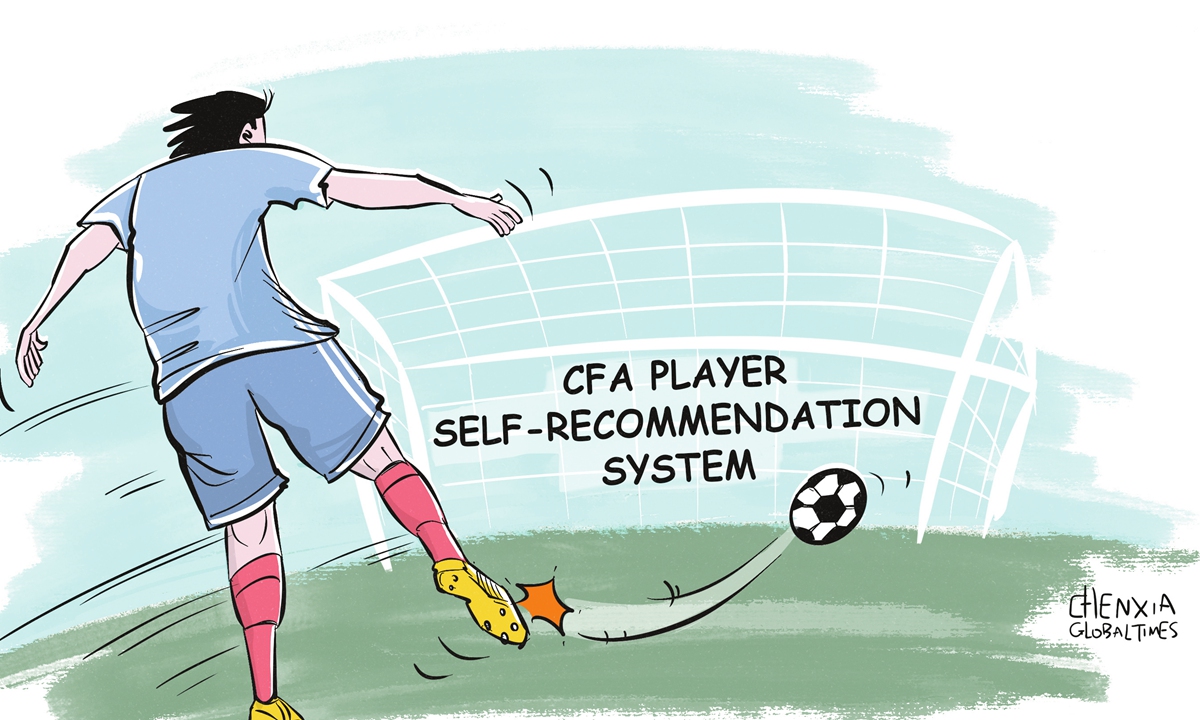
Illustration: Chen Xia/GT
The recent launch of a player self-recommendation system under the purview of the Chinese Football Association (CFA) marks a significant step forward in the development of Chinese football. This initiative, which allows all domestic players to recommend themselves, has far-reaching implications and potential benefits for the sport in China.
One of the primary objectives of this system is to address the long-standing issue of narrow talent selection.
Historically, the talent pool has been limited, relying mainly on recommendations, which often left many talented players on the sidelines. For instance, in the past, there were reports of talented young players in rural areas or small cities who were left out in the traditional football talent-scouting system. Their skills were not recognized simply because they did not have the information or were not in the areas where scouts usually operate.
The new self-recommendation system changes this.
By providing an additional channel for players to showcase their abilities, it breaks the monopoly of the old-fashioned referral-only system.
"The new system opens the door for those diamonds in the rough, who might have been overlooked due to the limitations of the previous selection mechanism," Zhang Bin, a Beijing-based sports commentator, pointed out to the Global Times on Sunday.
The self-recommendation system may also have a crucial role in combating corruption in grassroots football selection.
In the traditional system, there have been rumors of "relationship-based" selections and "under-the-table" dealings.
Traditional reliance on club or regional recommendations often sidelined promising players who lacked connections. The new system explicitly targets this issue, with the CFA stating it aims to "prevent corruption in grassroots football talent selection."
The anti-corruption storm that has taken Chinese football since November 2022 has exposed past issues in this practice, as former national team head coach Li Tie accepted bribes to influence player selection for the national team.
The new system aims to eliminate such unfair practices. By making the selection process more open, it reduces the opportunities for corruption and ensures that talent, rather than personal connections, determines who gets selected.
Despite the extensive reach of campus football and social training institutions nowadays, there are still gaps in the youth training system.
The player self-recommendation system may also serve as an effective supplement. For example, in some remote schools where football resources are scarce, students may not have sufficient opportunities to be noticed by mainstream youth training programs. Now, through this system, they can present their skills and potential.
The system's emphasis on "dynamic tracking and re-evaluation" is also a game-changer. In contrast to the traditional "one-and-done" selection method, in which a player's career could be derailed by a single poor performance, this new approach allows for a more comprehensive and long-term assessment.
Though the enthusiasm toward football in China is massive, China's football population is relatively small - with just 539,000 registered players in 2024, according to the CFA - compared to football powerhouses like Spain, France, or even neighboring Japan.
The self-recommendation system has the potential to significantly increase this number.
The system's emphasis on measurable skills, rather than personal endorsements, mirrors strategies employed by Spain's La Masia academy, which prioritizes technical benchmarks over subjective evaluations.
By setting clear and standardized requirements for self-recommendation, it not only ensures the quality of the selected players but also encourages all aspiring players to improve their professional skills.
In recent years, social media has been flooded with videos of grassroots players showcasing their amazing skills. However, there was a lack of formal connection between these grassroots talents and the professional football system. The new self-recommendation system might help bridge this gap as it provides an official platform for these players to gain attention from professional bodies.
For instance, one young player from a small town in China became an internet sensation for his extraordinary dribbling skills on social media.
With the launch of this system, he now has a legitimate opportunity to enter the professional football pipeline after delivering convincing performances while submitting the materials required.
This not only gives hope to countless grassroots players but also promotes the development of football at the grassroots level, as more people will be inspired to participate in the sport, knowing that there is a clear path to professional recognition.
In conclusion, the CFA's player self-recommendation system is a bold and necessary step. While its full impact will take time to materialize, the initial signs are extremely promising.
However, as the past scandals remind us, institutional goodwill alone isn't enough. While the system addresses structural flaws in China's football ecosystem, its success hinges on sustained transparency and systemic support.
For China's football dreams to materialize, this open-door policy must be matched by accountability, resources and patience.
By learning from both past failures and global models, it can unearth a new generation of talent.
The author is a reporter with the Global Times. life@globaltimes.com.cn




